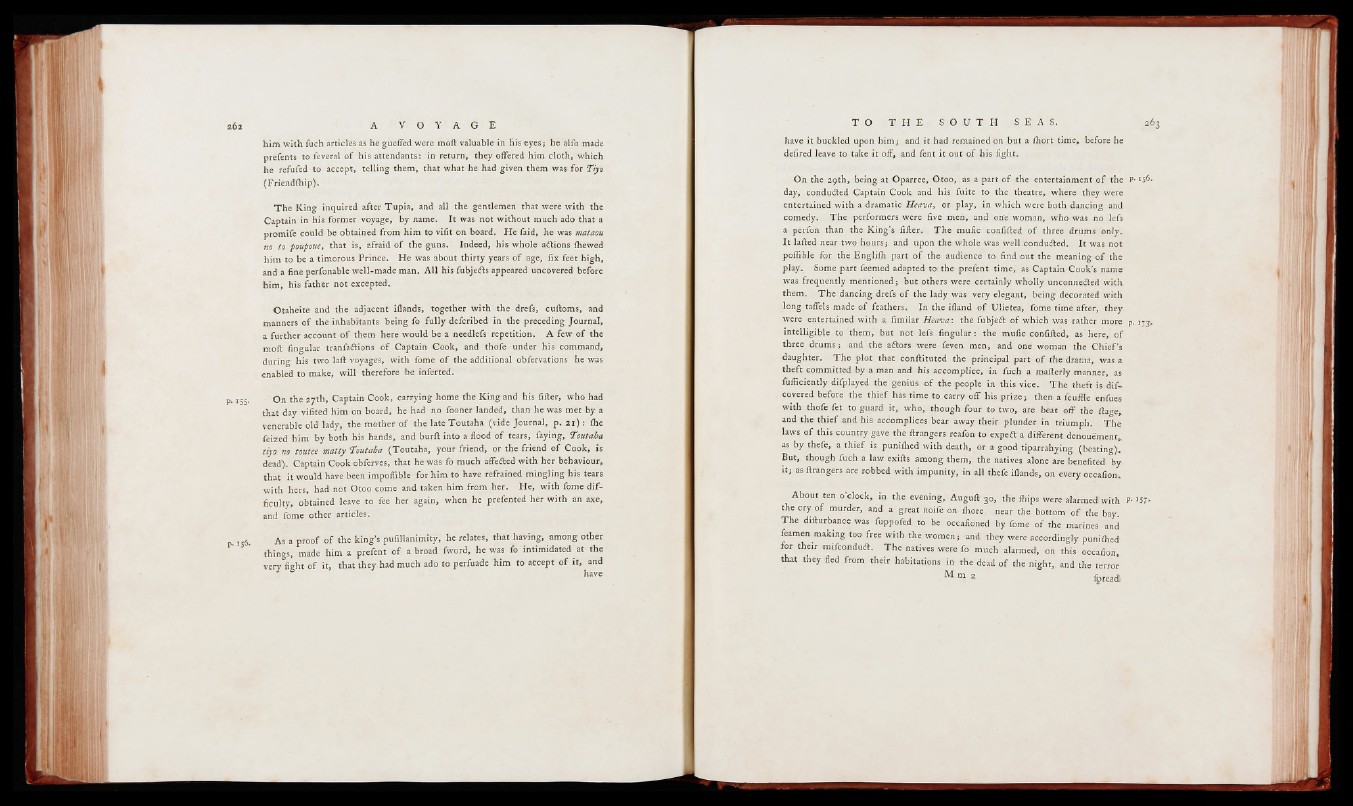
p. issp.
156.
him with fuch articles as he gueffed were moil valuable in His eyes; he alfo made
prefents to feveral of his attendants: in return, they offered him cloth, which
he refufed to accept, telling them, that what he had given them was for Tiyo
(Friendihip).
The King inquired after Tupia, and all the gentlemen that were with the
Captain in his former voyage, by name. It was not without much ado that a
promife could be obtained from him to viiit on board. He faid, he was mataou
no to poupoue, that is, afraid of the guns. Indeed, his whole act ions ihewed
him to be a timorous Prince. He was about thirty years of age, fix feet high,
and a fine perfonable well-made man. All his fubjeits appeared uncovered before
him, his father not excepted.
Otaheite and the adjacent iflands, together with the drefs, cuiloms, and
manners of the inhabitants being fo fully defcribed in the preceding Journal,
a further account of them here would be a needlefs repetition. A few of the
moil fingular tranfaitions of Captain Cook, and thofe under his command,
during his two lail voyages, with fome of the additional obfervations he was
enabled to make, will therefore be inferted.
On the 27th, Captain Cook, carrying; home the King and his lifter, who had
that day vifited him on board, he had no fooner landed, than he was met by a
venerable old lady, the mother of the late Toutaha (vide Journal, p. 2 1 ) : ihe
feized him by both his hands, and burft into a flood of tears, faying, Toutaha
tiyo no toutee matty Toutaha (Toutaha, your friend, or the friend of Cook, is
dead). Captain Cook obferves, that he was fo much affefted with her behaviour,
that it would have been impoflible for him to have refrained mingling his tears
with hers, had not Otoo come and taken him from her. He, with fome difficulty,
obtained leave to fee her again, when he prefented her with an axe,
and fome other articles.
As a proof of the king’s pufillanimity, he relates, that having, among other
things, made him a prefent of abroad fword, he was fo intimidated at the
very fight of it, that they-had much; ado to perfuade him to accept of it, and
have
have it buckled upon him; and it had remained on but a ihort time, before he
deiired leave to take it off, and fent it out of his light.
On the 29th, being at Oparree, Otoo, as a part of the entertainment o f the P* IS6*
day, conducted Captain Cook and his fuite to the theatre, where they were
entertained with a dramatic Heava, or play, in which were both dancing and
comedy. The performers were five men, and one woman, who was no lefs
a perfon than the King’s filler. The mufic confilted of three drums only.
It lalled near two hours; and upon the whole was well.conduced. It was not
poffible for the Englilh part of the audience to find out the meaning of the
play. Some part feemed adapted to- the prefent time, as Captain Cook’s name
was frequently mentioned; but others were certainly wholly unconnected with,
them. The dancing drefs of the lady was very elegant, being decorated with
long taffels made of feathers. In the illand of Ulietea, fome time after, they
were entertained with a fimilar Heava: the fubjert of which was rather more p. i7Tr
intelligible to them, but not lefs fingular: the mufic confilled, as here, of
three drums; and the artors were feven men, and one woman the Chief’s
daughter. The plot that conllituted the principal part o f the drama, was a
theft committed by a man and his accomplice, in fuch a mafierly manner, as
fuificiently difplayed the genius of the people in this vice. The theft is dif-
covered before the thief has time to carry off his prize; then, a feuffle enfues-
with thofe fet to guard it, who, though four to two, are beat ©IF the ilage,
and the thief and his accomplices bear away their plunder in triumph. The
laws of this country gave the llrangers reafon to expert a different denouement,,
as by thefe, a thief is punilhed with death, or a good tiparrahying (beating)!
But, though fuch a law exills among them, the natives alone are benefited by
it; as llrangers are robbed with impunity, in all thefe ilknds, on every occafion.
About ten o clock, m the evening, Auguft 30, the ihips were alarmed with P- r57-
the cry of murder, and a great noife on ihore. near the bottom of the bay.
The diflurbance was fuppofed to be occafioned by fome of the marines and
feamen making too free with the women; and they were accordingly punilhed
for their mifcondurt. The natives were fo much alarmed, on this occafion,
that they fled from their habitations in the dead of the night,, and the terror
M f l 1 %readi